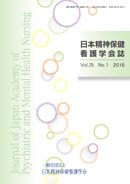Volume 17, Issue 1
Displaying 1-19 of 19 articles from this issue
- |<
- <
- 1
- >
- >|
-
Article type: Cover
2008Volume 17Issue 1 Pages Cover1-
Published: 2008
Released on J-STAGE: July 01, 2017
Download PDF (385K) -
Article type: Index
2008Volume 17Issue 1 Pages Toc1-
Published: 2008
Released on J-STAGE: July 01, 2017
Download PDF (84K) -
Article type: Index
2008Volume 17Issue 1 Pages Toc2-
Published: 2008
Released on J-STAGE: July 01, 2017
Download PDF (99K) -
Article type: Article
2008Volume 17Issue 1 Pages 1-11
Published: 2008
Released on J-STAGE: July 01, 2017
Download PDF (1278K) -
Article type: Article
2008Volume 17Issue 1 Pages 12-23
Published: 2008
Released on J-STAGE: July 01, 2017
Download PDF (1259K) -
Article type: Article
2008Volume 17Issue 1 Pages 24-33
Published: 2008
Released on J-STAGE: July 01, 2017
Download PDF (1159K) -
Article type: Article
2008Volume 17Issue 1 Pages 34-43
Published: 2008
Released on J-STAGE: July 01, 2017
Download PDF (1145K) -
Article type: Article
2008Volume 17Issue 1 Pages 44-52
Published: 2008
Released on J-STAGE: July 01, 2017
Download PDF (1028K) -
Article type: Article
2008Volume 17Issue 1 Pages 53-61
Published: 2008
Released on J-STAGE: July 01, 2017
Download PDF (1124K) -
Article type: Article
2008Volume 17Issue 1 Pages 62-71
Published: 2008
Released on J-STAGE: July 01, 2017
Download PDF (1134K) -
Article type: Article
2008Volume 17Issue 1 Pages 72-81
Published: 2008
Released on J-STAGE: July 01, 2017
Download PDF (1127K) -
Article type: Article
2008Volume 17Issue 1 Pages 82-92
Published: 2008
Released on J-STAGE: July 01, 2017
Download PDF (1182K) -
Article type: Article
2008Volume 17Issue 1 Pages 93-102
Published: 2008
Released on J-STAGE: July 01, 2017
Download PDF (1316K) -
Article type: Article
2008Volume 17Issue 1 Pages 103-112
Published: 2008
Released on J-STAGE: July 01, 2017
Download PDF (1200K) -
Article type: Article
2008Volume 17Issue 1 Pages 113-119
Published: 2008
Released on J-STAGE: July 01, 2017
Download PDF (781K) -
Article type: Article
2008Volume 17Issue 1 Pages 120-125
Published: 2008
Released on J-STAGE: July 01, 2017
Download PDF (763K) -
Article type: Article
2008Volume 17Issue 1 Pages 126-131
Published: 2008
Released on J-STAGE: July 01, 2017
Download PDF (822K) -
Article type: Article
2008Volume 17Issue 1 Pages 132-138
Published: 2008
Released on J-STAGE: July 01, 2017
Download PDF (942K) -
Article type: Cover
2008Volume 17Issue 1 Pages Cover2-
Published: 2008
Released on J-STAGE: July 01, 2017
Download PDF (186K)
- |<
- <
- 1
- >
- >|
